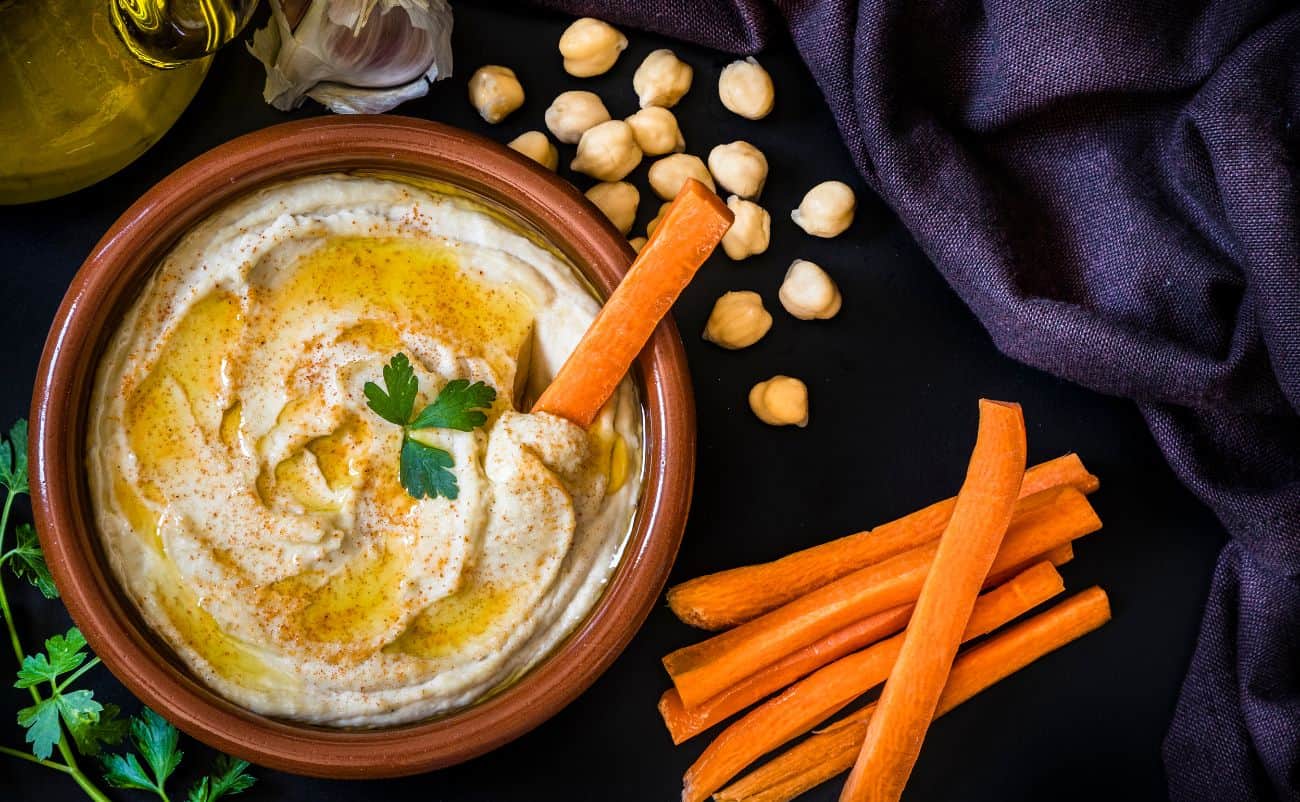
Mediterranean Diet Dessert Recipes for Weight Loss
You can enjoy Mediterranean desserts while losing weight by choosing recipes with fresh fruits, Greek yogurt, and olive oil instead of butter. Try honey-roasted fruit bowls (120-130 calories), protein-rich yogurt parfaits, or chocolate olive oil cakes made with 70% dark chocolate. Replace refined sugar with natural sweeteners like dates or monk fruit, control portions using small ramekins, and limit desserts to 2-3 times weekly. These simple swaps transform traditional Mediterranean sweets into weight-loss-friendly treats that won’t derail your progress.
Key Takeaways
- Mediterranean desserts use nutrient-dense ingredients like Greek yogurt, olive oil, and fresh fruits instead of butter and refined sugar.
- Honey-roasted fruit bowls and Greek yogurt parfaits provide satisfying sweetness with only 120-130 calories per serving.
- Replace butter with olive oil or tahini in traditional cookies to boost heart-healthy fats while reducing calories.
- Pre-portion desserts into single servings and limit indulgences to 2-3 times weekly for sustainable weight loss.
- Natural sweeteners like honey, dates, and monk fruit extract help maintain stable blood sugar levels and prevent cravings.
Why Mediterranean Desserts Support Your Weight Loss Goals
When you’re trying to lose weight, you don’t have to give up desserts entirely—Mediterranean-style sweets can actually support your goals. These desserts rely on Mediterranean ingredients like fresh fruits, nuts, and extra virgin olive oil, which naturally provide nutrient balance while keeping calories in check.
You’ll find they’re packed with fiber that promotes fullness and prevents overeating, unlike traditional sugar-laden treats. The healthy fats from olive oil and nuts boost your metabolism and improve insulin sensitivity, helping your body burn fat more efficiently.
These monounsaturated fats also enhance satisfaction, so you won’t crave seconds. Mediterranean cultures emphasize dessert moderation, enjoying sweets primarily during special occasions rather than daily. In fact, Mediterranean desserts are typically consumed in smaller quantities compared to portions common in other cultures.
When you do indulge, you’re getting antioxidants, vitamins, and minerals that support your metabolism—not empty calories. By choosing desserts with natural sweeteners like honey and fruit instead of refined sugar, you’ll maintain stable blood sugar levels and avoid the crashes that trigger cravings.
Essential Ingredients for Healthy Mediterranean Sweet Treats
While many desserts rely on processed ingredients that sabotage your health goals, Mediterranean sweet treats build their foundation on wholesome, nutrient-dense staples that naturally support weight management.
You’ll discover that extra virgin olive oil replaces butter, delivering heart-healthy monounsaturated fats with a mild, buttery flavor profiles perfect for sweets. Greek yogurt provides protein and probiotics while keeping calories in check. This approach embodies the Mediterranean philosophy of balanced simplicity, where naturally sweet ingredients create satisfying desserts without excessive processing.
Your Mediterranean pantry should include natural sweeteners like honey and dates, which offer superior nutrient density compared to refined sugar. Fresh fruits, nuts, and seeds contribute essential vitamins, fiber, and omega-3s that enhance satiety. Whole grain flours add complex carbohydrates and fiber, stabilizing blood sugar levels.
Don’t overlook flavor enhancers – fresh herbs, warming spices like cinnamon, and citrus zest amplify sweetness perception without extra calories.
These ingredients work synergistically, creating desserts that satisfy cravings while supporting your weight loss journey through balanced nutrition and sustained energy release.
Fresh Fruit-Based Desserts That Satisfy Sugar Cravings
You’ll find that Greek yogurt berry parfaits and honey roasted fruit bowls perfectly capture the Mediterranean approach to satisfying sweet cravings naturally.
These desserts combine protein-rich Greek yogurt with antioxidant-packed berries or warm, caramelized fruits drizzled with golden honey. Consider using goat milk yogurt as an alternative to control sugar intake while maintaining the creamy texture essential to these Mediterranean treats.
They’re simple to prepare yet deliver the sweetness you want while supporting your health goals through wholesome ingredients.
Greek Yogurt Berry Parfaits
Greek yogurt berry parfaits offer a perfect Mediterranean-inspired dessert that combines creamy protein-rich yogurt with antioxidant-packed berries for a treat that’s both nutritious and satisfying.
You’ll love these Greek yogurt benefits while managing your weight:
- High protein content (16-25g) keeps you fuller longer and supports muscle maintenance
- Natural sweetness from fresh berry varieties like strawberries, blueberries, and raspberries eliminates refined sugar cravings
- Quick preparation requires just layering yogurt, berries, and granola in minutes
- Flexible calories (245-422) fit your daily targets by adjusting portions
Choose nonfat Greek yogurt to reduce calories without sacrificing protein. Add 1/3 cup mixed berries for fiber and antioxidants, then top with 1/4 cup granola for satisfying crunch.
This Mediterranean-style dessert delivers essential nutrients while supporting your weight loss goals.
Honey Roasted Fruit Bowls
Transform your sweet cravings into a Mediterranean delight with honey roasted fruit bowls that deliver natural sweetness without derailing your weight loss goals.
You’ll combine fresh seasonal fruit combinations like strawberries, cherries, and mango, cutting them into bite-sized pieces for easy mixing.
Your honey roasting techniques involve drizzling honey mixed with citrus juice over the fruit, then gently warming to caramelize sugars without adding fats. This creates a warm, comforting dessert that’s surprisingly low in calories—just 120-130 per serving.
You can enhance flavors with fresh mint, citrus zest, or chopped walnuts for added crunch. The natural fiber keeps you satisfied while the honey’s antioxidants offer health benefits beyond refined sugar alternatives.
Greek Yogurt Parfaits and Protein-Rich Options
When you’re craving something sweet while following the Mediterranean diet, protein-packed Greek yogurt parfaits offer an ideal solution that satisfies without derailing your weight loss goals.
These versatile dessert variations combine creamy Greek yogurt with nutrient-dense ingredients, creating perfect nutritional balance through smart layering techniques.
Build your parfait with these protein sources and healthy toppings:
- Layer thick Greek yogurt with fresh berries for antioxidants and natural sweetness
- Add low-sugar granola and pre-soaked chia seeds for satisfying crunch and omega-3s
- Incorporate nuts or a scoop of protein powder to boost satiety
- Drizzle raw honey sparingly for authentic Mediterranean flavor combinations
You’ll maximize weight loss benefits by choosing unsweetened yogurt and controlling portions to about one cup.
For convenient meal prep, assemble parfaits in glass jars, keeping granola separate until serving to maintain texture.
This protein-rich dessert delivers 15-30g of protein while supporting your metabolism and keeping you full longer.
Chocolate Olive Oil Cakes for Guilt-Free Indulgence

Dark chocolate and olive oil unite in this Mediterranean-inspired cake that’ll satisfy your sweet tooth without sabotaging your weight loss efforts.
You’ll love how extra-virgin olive oil replaces butter, providing heart-healthy monounsaturated fats while creating an incredibly moist texture. The olive oil benefits extend beyond nutrition—it enhances chocolate’s intensity and adds subtle fruity notes.
Try different chocolate variations by using high-quality dark chocolate (70% cocoa or higher) or unsweetened cocoa powder. You’ll get powerful antioxidants and rich flavor without excessive calories.
Whisk eggs and sugar until fluffy, then gently fold in melted chocolate-olive oil mixture. Add espresso for depth—the caffeine may even boost your metabolism slightly.
Skip heavy frostings and instead dust with powdered sugar or top with fresh berries. Serve small portions alongside Greek yogurt for added protein.
This guilt-free dessert proves you don’t need to sacrifice indulgence while following the Mediterranean diet for weight loss.
Traditional Mediterranean Cookies Made Healthier
You’ll transform beloved Mediterranean cookies into healthier treats by swapping traditional ingredients for nutritious alternatives.
Your Greek almond cookies can use olive oil instead of butter. Tahini cookies benefit from reduced sugar and whole grain flour. Orange sesame cookies shine with natural citrus extracts replacing excess sweeteners.
These simple modifications cut saturated fat and calories while preserving the authentic flavors you’re craving.
Greek Almond Cookie Makeover
Transform your favorite Greek almond cookies into guilt-free treats that won’t derail your Mediterranean diet goals.
You’ll discover smart cookie ingredient swaps that slash calories while preserving authentic flavors. Traditional kourabiedes pack over 1,250 calories per serving, but your makeover version contains just 64 calories per cookie.
Master these baking technique tips for perfect texture:
- Whip egg whites with cream of tartar until stiff peaks form—this replaces butter’s richness
- Swap granulated sugar for monk fruit or erythritol to cut carbs from 9g to 1g per cookie
- Roll dough balls in sliced almonds instead of drowning them in powdered sugar
- Use superfine almond flour as your protein-rich, gluten-free base
You’re creating cookies with 5g healthy fats, 3g protein, and minimal net carbs—perfect for sustainable weight loss.
Tahini Cookie Lightening Tips
Switch your traditional butter-laden tahini cookies for a nutritious makeover that delivers authentic Mediterranean flavors with half the calories.
You’ll discover tahini benefits extend beyond taste – this sesame paste provides heart-healthy fats, protein, and fiber while replacing butter entirely.
Your cookie substitutions should include cutting sugar by 25%, using just ½ cup granulated and reducing brown sugar accordingly.
Add cinnamon to enhance sweetness perception without extra calories.
You’re getting 5-6 grams of protein per cookie, helping you stay satisfied longer.
Control portions by making 1-tablespoon cookies, and consider whole wheat flour for added fiber.
Store batches in the freezer to manage consumption.
These simple swaps transform indulgent treats into weight-loss-friendly desserts that maintain the creamy texture you love.
Orange Sesame Cookie Swaps
When you’re craving traditional Mediterranean orange sesame cookies, healthy swaps can slash calories by 40% while preserving the authentic citrusy-nutty flavor profile you love.
Replace butter with olive oil and swap all-purpose flour for whole-wheat pastry flour. You’ll boost fiber while cutting saturated fat.
Transform your cookies with these power swaps:
- Orange zest benefits: Add extra zest for vitamin C and natural sweetness without sugar
- Sesame seeds nutrition: Coat cookies in toasted sesame seeds for calcium, magnesium, and healthy fats
- Spice it up: Use cardamom and cinnamon instead of excess sugar
- Size matters: Shape walnut-sized cookies for automatic portion control
These modifications create lighter treats that satisfy your sweet tooth while supporting weight loss goals.
No-Bake Energy Bites and Quick Dessert Solutions
If you’re looking for Mediterranean diet desserts that require zero baking skills and minimal time, no-bake energy bites offer the perfect solution.
You’ll combine Medjool dates, almond butter, oats, and seeds in a food processor, creating nutrient-dense treats in just 15-20 minutes. These Mediterranean flavors come from ingredients like walnuts, cinnamon, and vanilla extract, while chia and flaxseeds provide omega-3s and fiber.
The high fiber and healthy fat content keeps you satisfied between meals, supporting your weight loss goals. Natural sugars from dates paired with protein create balanced, energy boosting effects without blood sugar spikes.
You can customize these bites with cacao nibs, dried fruits, or even olive oil for authentic Mediterranean fats.
Store them refrigerated for a week or frozen for three months, making meal prep effortless. These portion-controlled treats replace high-calorie processed desserts while delivering the satisfaction you crave.
Portion Control Strategies for Mediterranean Sweets

You’ll master Mediterranean sweet enjoyment by implementing three key portion control strategies that align with the diet’s balanced approach.
Pre-portioning your desserts into single servings, practicing mindful eating techniques, and using smart storage methods will help you savor these treats without derailing your health goals.
These practical approaches ensure you can include delicious sweets in your Mediterranean lifestyle while maintaining proper portion sizes and calorie control.
Pre-Portioned Serving Sizes
Two tablespoons of honey might seem insignificant, but controlling dessert portions makes the difference between enjoying Mediterranean sweets and sabotaging your weight loss goals.
You’ll find pre portioned desserts help maintain consistency while following serving size guidelines.
Here’s how to master portion control:
- Measure ingredients before preparing desserts – one ounce of dark chocolate or two tablespoons of nuts
- Use small ramekins to create individual servings that prevent overeating
- Pre-portion homemade treats into single servings immediately after making them
- Choose naturally portioned whole foods like individual yogurt cups with fruit
You’re setting yourself up for success when you control portions from the start.
These strategies ensure you enjoy Mediterranean sweets twice weekly without exceeding your calorie needs or compromising weight loss progress.
Mindful Eating Techniques
Have you noticed how quickly desserts disappear when you’re distracted?
You’ll eat less when you eliminate distractions and focus on each bite. Put down your fork between bites to create mindful pauses that help you recognize fullness cues. This simple technique prevents you from automatically reaching for more.
Enhance your sensory awareness by noticing your dessert’s texture, aroma, and flavor.
You’ll find smaller portions more satisfying when you truly taste what you’re eating. Use smaller dessert plates to make portions appear larger – research shows this visual trick reduces intake by 30-50%.
Practice these techniques consistently, and you’ll break habitual overconsumption patterns.
Your Mediterranean desserts become special treats rather than mindless indulgences, supporting your weight loss goals while maintaining enjoyment.
Smart Storage Methods
When you store Mediterranean desserts in pre-portioned containers, you’re setting yourself up for portion control success before temptation strikes.
You’ll naturally limit intake when treats are already divided into single servings rather than stored in one large container.
Transform your smart storage approach with these strategies:
- Freeze individual portions – Batch-make olive oil cake or fruit crisps and freeze in single-serve containers
- Use clear 4-6 oz containers – Visual cues help reinforce appropriate serving sizes for yogurt parfaits
- Employ airtight sealing – Preserve freshness of nut bars and dark chocolate while preventing frequent refills
- Label with serving information – Include dates and portion sizes for easy dietary tracking
These portion control methods ensure you’ll enjoy Mediterranean sweets mindfully without derailing your weight loss goals.
Natural Sweeteners That Won’t Derail Your Diet

While traditional Mediterranean desserts often rely on honey and fresh fruits for sweetness, you can explore modern natural sweeteners that won’t sabotage your weight loss goals. These alternatives offer distinct advantages through lower glycemic impacts and unique nutritional profiles.
| Sweetener | Best Uses |
|---|---|
| Monk Fruit Extract | Zero-calorie baking, beverages |
| Coconut Sugar | Direct sugar substitute with caramel notes |
| Stevia | Intense sweetening for small portion sizes |
| Erythritol | Sugar-like texture without blood sugar spikes |
Your sweetener comparisons should consider both glycemic index and caloric density. Monk fruit and stevia provide sweetness without calories or blood sugar impact, making them ideal for weight management. Coconut sugar retains B vitamins and antioxidants while offering a moderate GI of 54.
Watch your portion sizes carefully—even natural sweeteners can hinder weight loss if overused. Liquid options like agave blend seamlessly into recipes but contain concentrated fructose. Choose sweeteners that align with your health goals while maintaining Mediterranean dessert authenticity.
Weekly Dessert Planning for Sustainable Weight Loss
Since you’re serious about losing weight with the Mediterranean diet, strategic dessert planning becomes essential for long-term success. You’ll achieve dessert sustainability by designating 2-3 dessert days weekly rather than indulging daily. This approach honors Mediterranean traditions while supporting your calorie goals.
Smart planning strategies include:
- Prepare make-ahead treats like fig bites and energy balls for controlled portions
- Default to fresh fruit as your primary daily dessert option
- Reserve richer desserts featuring Mediterranean flavors for special occasions
- Batch-prep using overripe produce in smoothie bowls or baked goods
You’ll maintain interest by rotating between fruit-based options, Greek yogurt treats, and olive oil baked goods.
Remember to integrate dessert calories into your daily targets and practice mindful eating. Small portions of nutrient-dense sweets will satisfy cravings without derailing progress.
Focus on quality ingredients and savor each bite—you’ll discover that less truly becomes more when following authentic Mediterranean eating patterns.
Frequently Asked Questions
Can I Eat Mediterranean Desserts Daily While Trying to Lose Weight?
You can eat Mediterranean desserts daily while losing weight, but you’ll need smart portion control.
Fresh fruit works best as your go-to daily dessert. If you’re craving traditional sweets, make ingredient substitutions using honey instead of sugar and olive oil replacing butter.
Save richer desserts for special occasions. When you do indulge, keep portions small.
This approach lets you satisfy your sweet tooth without derailing your weight loss goals.
How Many Calories Are Typically in Mediterranean Diet Desserts?
You’ll find Mediterranean desserts range from 130 to 530 calories per serving, making calorie comparison essential for your choices.
Simple fruit-based options typically contain under 200 calories, while nut and olive oil desserts reach 250-315 calories.
The key to managing intake lies in portion control since healthy fats from nuts and oils increase caloric density.
Most servings provide moderate amounts of protein, fiber, and beneficial nutrients alongside their calorie content.
Are Mediterranean Desserts Suitable for Diabetics or Pre-Diabetics?
Yes, you can enjoy Mediterranean desserts if you’re diabetic or pre-diabetic.
They’re excellent for diabetes management when made with low glycemic ingredients. You’ll find these desserts use healthy alternatives like almond flour, berries, nuts, and natural sweeteners that won’t spike your blood sugar.
They’ll help you feel fuller longer while maintaining stable glucose levels. Choose options like Greek yogurt with berries or chia pudding for optimal blood sugar control.
Can I Make Mediterranean Desserts Without Specialty Ingredients?
You can absolutely make Mediterranean desserts without specialty ingredients!
Most recipes use everyday items like olive oil, honey, yogurt, and nuts that you’ll find at any grocery store.
Simple substitutes work perfectly – use dried raisins instead of fresh figs, peanut butter for almond butter, or regular spices instead of exotic ones.
These ingredient swaps maintain the authentic flavors while keeping recipes accessible and budget-friendly for home cooking.
Do Mediterranean Desserts Help Reduce Sweet Cravings Long-Term?
Yes, Mediterranean desserts can help reduce your sweet cravings long-term.
They’ll satisfy your sweet tooth while providing fiber, healthy fats, and natural sugars from fruits and nuts. These nutrient-dense treats stabilize your blood sugar levels, preventing the spikes that trigger more cravings.
Conclusion
You’ve discovered that Mediterranean desserts can actually support your weight loss journey when prepared thoughtfully. By choosing fresh fruits, Greek yogurt, and natural sweeteners, you’re creating treats that nourish your body while satisfying cravings. Remember to practice portion control and plan your weekly desserts ahead. With these recipes in your arsenal, you’ll never feel deprived. Embrace this balanced approach to sweets, and you’ll find sustainable weight loss becomes much more enjoyable and achievable.
Table of Contents






No Comments